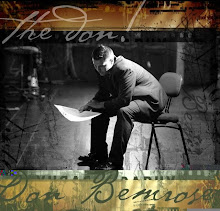"Ignorant men raise questions that wise men answered a thousand years ago." Johann Wolfgang von Goethe
There are some calling for a national debate on Aboriginal identity... or in more accurate terms they are calling for a general free for all to slam Aboriginal people. To slam Aboriginal youth, Aboriginal parents, Aboriginal communities, and Aboriginal people who aren't Aboriginal enough according to some non-Aboriginal people...
Rather than a national debate, I am calling for a series of national education.
Today's lesson is about what happens when you combine two racist stereotypes:
1. The idea that Aboriginality is something that is 'bred-out' of people over time. That once a person's physical appearance and/or 'blood-quotient' reaches a certain point, then that person can be considered to be not Aboriginal and;
2. The idea that Aboriginal people are a 'privileged group' in this country.
The result?
"the part-whites who are making a racket out of being so-called Aborigines at enormous cost to the taxpayers".
That is the heart of some recent and on-going tension in the media, but that isn't a recent quote.
It was said in 1988, by Bruce Ruxton... but it sounds like something that could have been said much more recently. Even more plausibly so now that 'Aborigines' seems to have made an unwelcome resurgence in the media lately.
This recent debate is actually quite old, and it is reliant on the fact that people don't know it is an old debate.
Any serious journalist with even a passing interest in Aboriginal identity, and an interest in serious reporting, would quickly find something like this research note, available from the Parliamentary Library, titled "Definition of Aboriginality".
It comes up when you do a google search for 'Definition of Aboriginality'...
It mentions:
"In his analysis of over 700 pieces of legislation, the legal historian John McCorquodale found no less than 67 different definitions of Aboriginal people.
Though colonial legislation initially grouped Aboriginal people by reference to their place of habitation (e.g. aboriginal natives of New South Wales and New Holland), 'blood' quantum classifications entered the legislation of New South Wales in 1839, South Australia in 1844, Victoria in 1864, Queensland in 1865, Western Australia in 1874 and Tasmania in 1912. Thereafter till the late 1950s States regularly legislated all forms of inclusion and exclusion (to and from benefits, rights, places etc.) by reference to degrees of Aboriginal blood. Such legislation produced capricious and inconsistent results based, in practice, on nothing more than an observation of skin colour."
Sounding familiar yet? "based, in practice, on nothing more than an observation of skin colour"!
What a long way we have come...
but wait, there's more:
"When policy entered a more progressive period in the late 1960s and 1970s the blood-quantum definitions, which had never been accepted as meaningful by Aboriginal communities themselves, were relatively easy to abandon."
"In the 1980s a new definition was proposed in the Constitutional Section of the Department of Aboriginal Affairs' Report on a review of the administration of the working definition of Aboriginal and Torres Strait Islanders (Canberra, 1981). The section offered the following definition:
An Aboriginal or Torres Strait Islander is a person of Aboriginal or Torres Strait Islander descent who identifies as an Aboriginal or Torres Strait Islander and is accepted as such by the community in which he (she) lives.
This three-part definition (descent, self-identification and community recognition) was soon adopted by Federal Government departments as their 'working definition' for determining eligibility to some services and benefits."
"The advantages of this three part definition were not, however, apparent to all. In 1988 the Victorian State president of the RSL, Mr Bruce Ruxton, called on the Federal Government:
to amend the definition of Aborigine to eliminate the part-whites who are making a racket out of being so-called Aborigines at enormous cost to the taxpayers'.
" the three part definition has generally been found to help protect individuals from the tendency among 'mainstream Australians' to consider 'real' indigenous people as people living somewhere else and others as manipulating the system."
"It also sits well with the definition used by the UN Working Group on Indigenous Populations in 1986:
Indigenous communities, peoples and nations are those which, having a historical continuity with pre-invasion and pre-colonial societies ..., consider themselves distinct from other sectors of the societies now prevailing in those territories ... They form at present non-dominant sectors of society and are determined to preserve, develop and transmit to future generations their ancestral territories, and their ethnic identity, as the basis of their continued existence as peoples, in accordance with their own cultural patterns, social institutions and legal systems."
And here endeth the lesson...
... but right now, as I write this, I get the image of a man trying to explain to an angry mob why he shouldn't be burnt at the stake for arguing that the world is actually round... and that the matter was actually resolved quite a long time ago... and that we don't burn people at the stake anymore... and that it is kind of silly to believe in a flat earth in 2011... and again, please don't burn me at the stake for pointing out the obvious!
If we want to discuss Aboriginal identity and failure in Aboriginal programs that is fine by me, in fact I strongly encourage that conversation; but I must ask that we include Aboriginal people, and consider relevant information, as well. Two things that have been sorely lacking in the media on these issues, and on most issues affecting Indigenous people over the past four decades or so...
Oh, and if we could cut out the malicious racism, misinformation, lack of Indigenous representation, and maybe even include a capital I for Indigenous, and avoid terms like 'Aborigines' in these 'discussions', then that'd be just great too... thanks.
... and to answer the question that is the title of this article: No.



